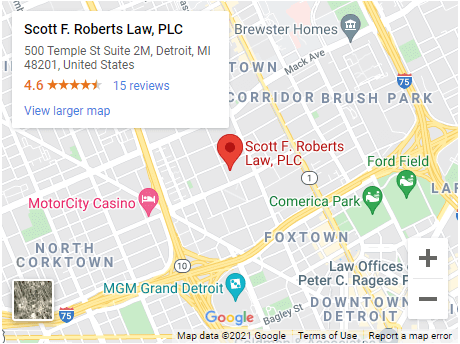Restricting Medical Dispensaries with Detroit’s New Ordinance Will Hurt Medical Marijuana Businesses, and Their Business Partners
If you follow the Michigan cannabis industry at all, you are well aware that the City of Detroit has just passed an updated ordinance creating a recreational licensing program and is finally bringing recreational cannabis to the city. The ordinance has long been awaited as Michigan and Detroit legalized and then respectively opted into recreational cannabis in 2018. However, the city still does not have any recreational cannabis businesses within it.
As a result, Michigan’s largest economy (Detroit) has effectively been kept out of one of the fastest growing industries in the country. This delay means Detroit has missed out on potentially millions of dollars of tax revenue over the last four years. Nevertheless, the city has finally crafted an ordinance that will allow for the business owners to apply for and receive recreational cannabis business licenses. However, there are many who may not appreciate this specific licensing structure.
The city aligned its ordinance close enough to other municipal adult-use ordinances and Michigan statutes that it prevailed under legal challenge. Despite their legal win, one aspect of the new Detroit ordinance runs contrary to the outcome many industry observers hoped to see for medical marijuana provisioning centers (i.e. medical dispensaries that have been operating and employing Detroit residents since the MMFLA was passed). This ordinance language is found in § 23-6-38(e), which states a requirement that any current operator of a medical cannabis dispensary will not be able to apply for a recreational license until January 1 of 2027.
The reasoning behind this forced waiting period is likely to give a chance for new business owners to enter the city and apply for recreational licenses without competing with experienced medical dispensary entities. However, this runs counter to what most (if not all) medical provisioning center operators in the city assumed would occur when Detroit finally crafted a viable adult-use ordinance.
While medical operators believed they would be first in line to receive recreational licenses because they were experienced with government compliance, the Detroit is structured to give more chances to newcomers in the industry by restricting experienced, (and most importantly) compliant cannabis entities from even applying. The fact is that medical cannabis businesses in Detroit have been compliantly operating for many years – they know the industry dos and don’ts – and are best equipped to handle cannabis businesses that benefit city, government, and taxation interests. This is often what has occurred in Michigan municipalities that have transitioned from a medical only program to a med and rec scheme – perhaps the city recognized what would occur if it allowed the experienced medical businesses to compete for rec licenses – they would properly win available licenses from being the most viable candidates.
Regardless of the reasoning, it is a harsh reality for medical business owners who have invested millions in anticipation of maturing their businesses into recreation dispensaries. For many medical entities, the strategy was to operate a successful medical cannabis entity for a time, participating in city investment and establishing themselves with the CRA and other regulatory agencies, to make their process of getting a recreational license that much smoother to bring a rec dispensary online.
Unfortunately, it appears that this strategy will not bear the fruit these businesses believed it would. Thus, the investment that these medical provisioning centers represent to their owners is likely to be lost over the next 5 years. Being unable to apply for and add recreational options to their medical storefronts is very likely to put many if not all of the medical operators out of business.
The medical industry simply cannot compete with the recreational industry as far as sales and revenues are concerned. The medical industry has steadily been shrinking statewide in every state that has also legalized adult-use cannabis. There will always be a minimum basis of medical patients given the myriad of medicinal properties cannabis has with more being discovered, but the simple fact is that purchasing recreational cannabis is… simpler. Not having to go through the expensive certification process with a physician, not having to complete the application with the state, and no patient registry card fee has resulted in many Michiganders opting to just not renew their status and purchase recreational cannabis. The result is a precipitous drop in medical sales and a far greater increase in recreational sales – there is currently a 6:1 ratio of rec sales to medical sales.
What this looks like at street level is the decline of medical operators of all kinds, or at least those that are prohibited from partaking in recreational sales. Most municipalities do not have restrictions on medical entities adding recreational capacity to their operations, from cultivators and processors to testing facilities and dispensary locations, they handle both medical and recreational cannabis. Without the ability to break into the recreational industry as it picks up speed in Detroit, many medical cannabis businesses are preparing for the worst.
There are currently 62 active medical dispensary licenses in the city of Detroit, more than any other Michigan city. Those 62 licenses represent so much more than just 62 businesses being threatened by the recreational ordinance restrictions, they represent the hundreds of employees associated with these businesses, they represent the contracts they have with cultivators, processors, laboratories, and transporters in the industry that help to sustain those businesses and their employees. Those licenses also represent the hundreds of thousands of dollars those businesses have invested in the Detroit community with the hope that they would be able to acquire recreational licensing and expand their established medical businesses.
As of now, the future is unclear for medical dispensary owners. The way the new ordinance currently reads, medical dispensary owners will have to find a way to survive until Jan. 1, 2027 to even apply for recreational retailer licensing. This provides no guarantee that they will win a license from those applications, or if there will even be any retailer licenses available at that time. There could be provisions added to the ordinance that would offer some sort of protection to medical dispensary owners, but without a strong advocate base and the numerous delays the ordinance has already undergone, any further changes to it seem unlikely.
This may spell turbulent seas ahead for medical dispensary owners, and it shouldn’t be done alone. The experienced cannabis legal team of Scott Roberts Law is an excellent resource for any cannabis business issues, schedule your consultation today to see if we can assist you with your medical marijuana business concerns.




